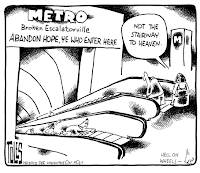
This week the Summer 2010 class of Glenn Fellows is reading Samuel Huntington's famous Foreign Affairs article on "The Clash of Civilizations." As an introduction to the not-always-glamorous world of professional diplomacy, I have also assigned a book called A Diplomat's Progress, written by Henry Precht, a retired foreign service officer. Mr. Precht was born in Savannah, Georgia, and educated at Emory University. He joined the foreign service in 1961 and served in U.S. embassies in Italy, Mauritius, Iran, and Egypt. He was the Department of State’s Desk Officer for Iran during the revolution and hostage crisis when the Shah was overthrown, and he was deputy ambassador in Cairo when Anwar Sadat was assassinated. His nomination by President Jimmy Carter to the post of U.S. ambassador to Mauritania was vetoed by Senator Jesse Helms.
After leaving the foreign service, Mr. Precht served as president of the World Affairs Council in Cleveland, Ohio, where he also taught at Case Western Reserve University. A few years ago, he published A Diplomat’s Progress, a work of fiction consisting of a series of vignettes about a State Department official named Harry Prentice. It is an engaging work that reveals, as one reviewer has put it, the “grittier side of embassy life with a wry sense of humor and a bit of an edge.” To the extent that the work is autobiographical, A Diplomat’s Progress is rather remarkable.
For one thing, the “grittier” aspects of diplomacy are portrayed warts and all. In one of the vignettes, the young Harry Prentice and his wife attend a dinner party at the home of the foreign minister of Mauritius, during which the lecherous host assaults the drunken daughter of the Japanese ambassador. In a vignette set in Egypt, the protagonist must tend to a dead body and a suitcase full of drug money. In “Caviar and Kurds,” Prentice unwittingly leads the Shah’s secret police to an underground freedom fighter named Hassan, whom Prentice finds hanging from a lamppost the next day. In this account of embassy life, no good deed goes unpunished.
Most remarkable as an autobiography—and surely it must be regarded as partly that, in spite of the veneer of fiction—is the book’s unflattering portrait of its protagonist. Throughout A Diplomat’s Progress, Harry Prentice’s diplomatic efforts are undone by either his naivete or his cynicism. Typically, the reader is given a glimpse of a career diplomat preoccupied, not with the national interest, as one might suppose, but rather, with his own career advancement. At one point, for instance, Prentice seems to have been the unwitting accomplice of a Palestinian terrorist. What does he do about it? He gets up in the middle of the night to compose a somewhat Bardachian “balance sheet of possible courses of action.” There appear to be two:
First, the natural inclination of every Foreign Service Officer: Do nothing. Wait on events and react as necessary and as seems prudent at the time. . . . Alternatively, I could report my suspicions to the police. Playing it straight and admitting wrong might be partially redeeming. The key word was “partially.” The embassy surely would be informed and handle my future as if it had no value. The same with the Israeli authorities. I had to face it: Only I really cared about my future, not any American or Israeli career-building bureaucrat.
During his posting to Cairo, Prentice is asked to interview a Sheikh who might have been in a position to influence the extremists holding a number of American hostages in Beirut. Prentice’s efforts fail. “But never mind,” seems to sum up his reaction. “I could only hope that someone—the ambassador or an unknown friend in the department—would make an excellent report of my performance for my file.” The adventure, he concludes, “just might be a turning point—upward—in my career.” On the basis of the evidence provided by the author, the judgment handed down by Prentice’s first wife seems just: He has “a pretty good soul, even though sometime it seems quite lost in the bureaucratic maze.”
Mr. Precht is a charming gentleman who has visited our seminar in the past. Unfortunately for us, he spends his summers in Maine.







